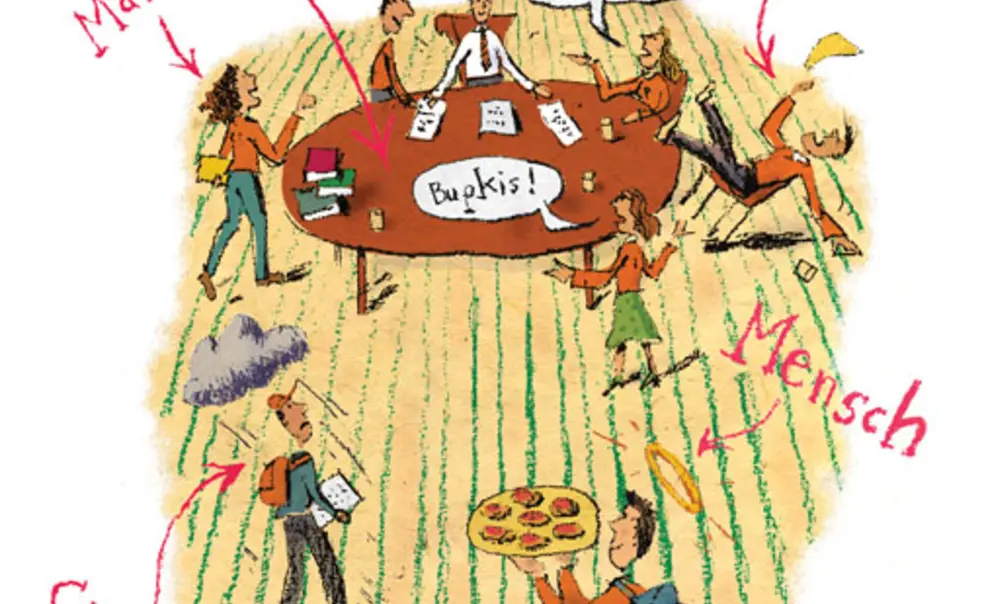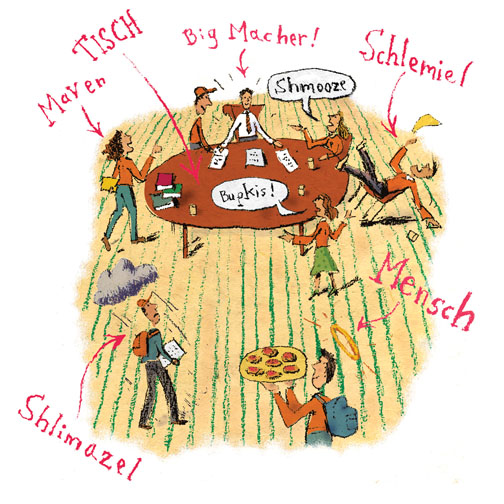A passion for Yiddish; minority mentors at WWS
What do a prospective ecology and evolutionary biology major, a classics graduate student, a Woodrow Wilson School graduate student, and a retired physicist have in common? They all come together to speak Yiddish Tuesday nights at Princeton’s newly formed Yiddish Table.
At the seven campus dining halls, students do not just ess before schlepping their backpacks to class, or nosh while kvetchingabout work. Many speak in tongues: Vietnamese, Hindi, Romanian, Cantonese, Kiswahili. More than 20 language tables encourage native and novice alike to practice their skills over dinner.
Founded this fall by Miriam Geronimus ’12, the Yiddish Tisch is Princeton’s newest language table and draws a small but passionate following who discuss Yiddish literature, music, politics, jokes, and sayings (“If you find a worm in the horseradish, you know it’s sweet”). “People say it’s a dying language, which is ridiculous,” explained graduate student Geoff Anisman. “It’s becoming very cool.”
Inspired by the stories of Shalom Aleichem, which were the source of the musicalFiddler on the Roof, Geronimus took off last year to study Yiddish at programs in New York, Michigan, and Massachusetts. On her return, she was determined to bring the language and culture to Princeton.
Jeremy Furchtgott ’12 has yet to learn Yiddish, but he does love and play Yiddish music, specifically klezmer — an Eastern Europe style at once exuberant and plaintive. Furchtgott, who joined with four other students last year to form a klezmer ensemble, said that “Yiddish is more than the language, it’s a culture.”
Why Yiddish? For many of the students, it is a connection to their past. “I always wanted to know because of my roots,” said Aviv Rosenblatt, a classics graduate student. Geronimus, too, sees the language as a way to connect to grandparents she never knew, but admits, “I don’t really know if there is a logical reason for my learning Yiddish. It resonates with me. I feel happy reading or speaking Yiddish.”
By Ben Fong GS
More than 60 alumni returned to campus in mid-November to mentor master’s-degree students and offer “perspectives from the field” during the Woodrow Wilson School’s annual Students and Alumni of Color Symposium. Organized by first-year graduate students, the conference was an opportunity for students, alumni, and administrators to discuss issues relating to minority communities at Princeton and in the nation.
Under the theme of “Hope and Change: Communities of Color and the New Administration,” panels covered topics such as the recession’s impact on minority communities and challenges facing urban areas. The event also included a student-made film, All Eyes on Florida, about the aftermath of the 2000 presidential election.
Among the speakers was DeAngela Burns-Wallace *98, director of access initiatives at the University of Missouri–Columbia and winner of the Edward Bullard Award, presented annually to a Wilson School alum who works with minority communities and mentors current WWS students. In the keynote address, Joshua DuBois *05, director of President Obama’s Office of Faith-Based and Neighborhood Partnerships, argued against the notion that race is no longer relevant in the era of President Obama.
M.P.A. students Lyan Pernala and LaSean Brown, who managed a team of more than 40 students who put the symposium together, said the participation of more than half of the first-year class reflected a growing consensus that diversity is an important part of the Princeton experience. Many alumni, including Lisa-Nicolle Grist *92, said that their willingness to advise students was spurred by a lack of mentoring in their own careers.
Students cited the alumni’s willingness to make connections. Alex Flores GS said the conference enabled him to “develop relationships with alumni on a personal level” and said he continues to talk with six alumni.
John Templeton, the school’s assistant dean for graduate admissions, said the conference provided students with role models, networking opportunities, and “the affirmation that they can do it.” WWS diplomat-in-residence James Gadsden *85 agreed, noting in his closing speech that students “should be encouraged to think big.”













No responses yet